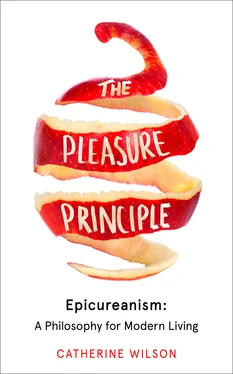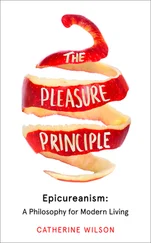The totality is made up of bodies and void … Beyond these two things nothing can be conceived … Among bodies, some are compounds, and some are those things from which compounds have been made. And these are atomic and unchangeable …
Epicurus
There are certain particles whose concurrences, movements, order, position and shapes produce fires; different combinations of them form things of different nature, but they themselves are unlike fire or any other thing …
Lucretius
Let’s start with a set of questions – large ones, with significant implications – to which the Epicurean has a definite answer. Is there anything completely indestructible and permanent in the universe? If so, what is it? And why does the Epicurean answer to such an abstract question matter?
In thinking about endurance, we can immediately rule out tables and chairs, houses and skyscrapers, pens and pencils, and all other objects that human beings fabricate. All of these items have finite useful lives ranging from a few months to a few thousand years. Any of these items can be broken up by taking a crowbar or a wrecking ball to it, or just by snapping it in two in the case of pens and pencils. Left to themselves, over hundreds or thousands of years, each of these items will crumble into dust. Plastic bags, we have learned to our dismay, will persist for an astonishingly long time, perhaps a thousand years in landfills, but eventually they, too, will be broken down by light or heat, or by chemicals or micro-organisms.
Very well, what about enormous natural objects like mountains or the ocean? They are not so easy to destroy, but enough nuclear weapons or a very large asteroid could flatten the Himalayas. And in time – in hundreds of millions or several billion years – all life on our planet will have long been extinct. The earth will be consumed by the sun within 5 billion years, and our galaxy will collapse.
What, then, about the chemical elements – hydrogen, carbon, uranium and so on? There are many competing scenarios for the end of the universe as we know it and the disappearance of every galaxy, but in all of them the chemical elements, too, will eventually vanish.
Even time and space, and the so-called elementary particles, the quarks and gluons and bosons, will cease to exist, according to current theory.
But, surely something must continue to exist! The universe can never wind down into nothing … zero … total annihilation …?
The ancient Epicureans argued that everything in our experience is perishable and will someday perish. But once something exists, they reasoned, it cannot just become nothing . Correspondingly, the entire universe could not have come out of nothing. It follows that the universe must have emerged from something and that something will always exist, no matter how broken up the objects of experience come to be.
If they were right – and let’s go along with their reasoning – after the destruction of every man-made object, every geographical feature, every star and planet, and every chemical element, and after the disappearance of time and space, something must be left from which a new universe could be rebuilt.
From the time that human beings began to philosophise, many came to the conclusion that the eternal something that existed before the universe ever appeared and that can maintain it or even outlast it must be intelligent and creative – a Mind with a Plan. Creation stories take many different forms, but they have in common the idea that there must have been a definite beginning to the world and that it was brought into being for some purpose by its Creator. Human beings were the special concern of this powerful entity, and the rest of the universe was constructed according to the needs and characteristics of human beings and the grand plan of the Creator for them.
Epicurus rejected these assumptions. He maintained to the contrary that the elements of the universe are eternal and uncreated. There is no ruling mind or master plan involving them. His reasoning begins from the idea of destruction rather than from the idea of construction.
Destruction occurs when the parts of a thing, whether a boulder, or a house, or an animal body, are separated from one another by tearing, grinding, smashing, chopping, wearing away or being exploded. The truly indestructible and permanent things that remain after all such operations are the ‘atoms’ – in Greek, the ‘uncuttables’. Epicurean atoms are the ancestors of the modern scientific concept of the atom, but somewhat differently imagined. They are located and move in the void, the empty space separating visible objects and constituting the tiny gaps between the atoms of different shapes and sizes within objects. Apart from the atoms and the void in which they move and collect, sticking together and interweaving, there is nothing.
These atoms, Epicurus supposed, are far too small to be seen by human eyes. But the existence of tiny indestructible particles composing everything was suggested not only by the reasoning just described but by common observations. ‘A finger ring,’ says Lucretius, ‘is worn thin on the inside; the fall of water drop by drop hollows a stone; we see the stone pavements of streets worn away by the feet of the crowd.’ The atoms were thought to resemble the dust motes that can be seen drifting in a ray of light coming in through a window. According to Epicurus, they have different shapes and sizes, but are devoid of colour, taste and scent. They can move in all directions and have no tendencies except the tendency to fall downwards, and the ability to rebound from one other, and to become entangled with other atoms to form physical objects of perceptible sizes. Frequently, an atom ‘swerves’ in an unpredictable fashion. If they didn’t, they’d all end up in a pile at the ‘bottom’ of the world.
The Epicureans theorised that, given sufficient time, the atoms would fall into stable patterns. They would form multiple worlds, or ‘cosmoi’, each with its own plants and animals, its own stars and sun. Such worlds were, they thought, constantly coming into being and breaking up, furnishing the material for recycling into new worlds.
‘The same atoms,’ Lucretius points out, ‘constitute sky, sea, lands, rivers and sun: the same compose crops, trees and animals.’ But if the atoms have no qualities other than size, shape and motion, how can they give rise to our noisy, colourful, scented, textured world? The answer, he explains, is that combinations and arrangements of atoms can take on qualities they do not possess individually. He employs the analogy of letters and words.
The 26 letters of the Roman alphabet can be combined into at least 100,000 meaningful words of the English language. Some linguists maintain that there are up to 1,000,000 words in English, though nobody’s vocabulary could have that breadth. And from even 100,000 words, millions of intelligible, grammatically correct sentences, expressing millions of thoughts and experiences and observations can be formed. Sentences have ‘emergent’ qualities that the letters and spaces composing them do not possess. They can be gentle or inflammatory. Unlike individual letters, they can communicate information, persuade, mislead, enable actions or start a riot. In an analogous way, Lucretius suggested, starting with combinations of ‘primitive’ elements with only a few properties, everything in the noisy, colourful world of experience can be produced.
When it came to vision and hearing, the ancient Epicureans held the interesting theory that sights and sounds were rather like scents. ‘Various sounds,’ says Lucretius, ‘are continually floating through the air … When we walk near the sea, a briny taste often makes its way into our mouth; … From all objects emanations flow away and are discharged in all directions on every side.’ When we smell bacon frying in another room or catch a whiff of someone’s perfume, we can infer that tiny particles made up of still smaller atoms have drifted into our noses from some distance. Tiny particles flow into our eyes and ears as well. For the Epicureans, when I see a tree, a thin ‘film’ of coloured particles actually detaches itself from the tree and floats into my eyes. Objects, they supposed, were constantly emitting these films from their surfaces and so wearing away, while replenishing their substance by absorbing particles from the environment.
Читать дальше












